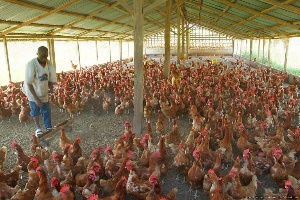A Crop Physiology and Crop Improvement Scientist Dr. Michael O. Adu, a Senior Lecturer at the Crop Science Department, University of Cape Coast and Dr. Ebenezer Gyamera, a Lecturer and the Acting Farm Manager of the same university have said that coronavirus has affected every aspect of human life including Agriculture.
They were both speaking on GBC Radio Central's Central Morning Show on Friday 24th April, 2020 on the topic "COVID-19: effects on Agriculture" hosted by D. C. Kwame Kwakye.
Dr. Gyamera who has a speciality in Animal Husbandry & Nutrition asserted that there is a common medicine called iron dextran which is given to piglets three days after they are born which is now very scarce. The shortage is likely to lead to high mortality of piglets on pig farms as a result of anaemia due to the unavailability of the medication on the market. He attributed the shortage of the drug and other veterinary supplies to panic buying by well-to-do farmers.
The expert said the border closure has affected the importation of day-old chicks into our country. "About 95 per cent of all day-old chicks raised in Ghana are imported". The lockdown and the border closure would affect the importation and farmers cannot get birds to keep".
"Eggs become abundant during September-October of every year but I can assure you that, egg production would dwindle and the price of eggs would go up making it expensive".
He averred that he saw something on social media where a dairy farmer in the USA was throwing 54,000 litres of fresh milk away. The reason being that the cheese manufacturing company that would have purchased the milk for further processing is out of production because of coronavirus. "The farmer cannot drink all the fresh milk and has no facility to store and this becomes a huge cost to the farmer" he added.
He explained further that, broilers that were raised to be sold at Easter were not sold during the Easter due to the lockdown in some parts of the country and observance of social distancing protocols. The effect is that most of such birds are still being fed by farmers hence increasing their cost of feeding. "One sad aspect is that when broilers become heavy up to a certain weight they can collapse and die" resulting in huge financial losses to the farmer.
Dr. Gyamera speaking about Lockdown areas, said, in Abokobi, a suburb in Accra, farmers couldn't farm due to the partial lockdown and that is one area where people farm a lot in the capital city. "When this happens, farmers lose out and it affects the food chain as well".
The Acting Farm Manager said in the wisdom of the government some economic activities were allowed to go on even during the partial lockdown because in his view, for instance, if someone has gone to buy tomatoes and is unable to sell within about 4 days all those goods would get rotten. "That decision by the government was in the right direction and that cushioned farmers a bit".
In responding to what can be done going forward, he implored government to consider assisting farmers and in his view, the 600 million Ghana Cedis government has earmarked for SME's, farmers should be considered because most of the SME's get their inputs from farmers. "Not supporting farmers would make the support by government incomplete" Dr. Gyamera added.
"Everything that needs to be done can be done because where there is a will there is a way" Dr Gyamera said. He was responding to how farmers can be supported within our peculiar unstructured society. He further added that "Agric Extension Officers can help out in identifying farmers who would need help and same can be supported but was quick to add that not all farmers need government support post COVID-19".
Reacting to a caller's question as to how government can support farmers by taking an active part in farming activities, Dr. Gyamera said there are two main paths or approach to this. There is Socialism where we all farm for government and capitalism where farms belong to individuals and not the state. He further said, "Ghana is a capitalist country and if a farmer needs help then he must go and register under the government's policy of Planting for Food and Jobs (PFJ). Under this programme, all you need to do is to go to the District Agric Office and register and get all the necessary government support.
Dr. Adu, on the other hand, responding to the same question admonished that, Ghana is very lucky because there wasn't total lockdown and as such farmers could go and plant their crops. He was quick to add that all farmers should be careful and observe all protocols as prescribed by the Ghana Health Service especially social distancing. He argued that there are good lessons to be learnt from the COVID-19 situation. Efforts should be made in building resilient systems for future occurrences. This should include enhancing local capacity and manufacturing of agro-inputs and in processing agricultural products.
The crop Physiology and Improvement Scientist, Dr. Adu explained further that, the agricultural value chain is complex and long, involving producers, marketers, transporters, processors and consumers. In total lockdowns, farmers cannot farm and farm produce cannot be transported. Agro inputs will not also move. These would be very dire for a country like Ghana whose farming is mostly small-scale subsistence and the arable lands are poor in quality. Farmers would have reduced yields and that would affect them economically. Particularly for perishable goods such as vegetables and fruits, lockdowns could lead to massive deterioration. This would effectively alter supply and demand dynamics, and impact prices, ultimately affecting consumers.
When asked about how COVID-19 can affect our farming situation in Ghana, he said our situation is better since we never experienced total lockdown. He recounted his experiences when buying fruits for his son he had to think twice because he was somehow scared not knowing where the fruits had come from and how it had been handled. He was reluctant to buy fruits such as bananas which are eaten raw. Such consumer behaviours, he said, could impact farmers adversely.
In concluding the discussion, Dr. Gyamera said "I have been very happy with the kind of love shown by Ghanaians towards fighting COVID-19 but same help should be extended to either an old man or old lady who is a farmer in your community. You can look for any farmer in your area and ask him or her what can be done to help and provide either seedlings or seeds or any other input to assist such a farmer".
Click to view details



Business News of Saturday, 25 April 2020
Source: Kwame Kwakye, Contributor

















